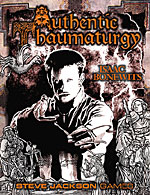|
Here’s an excerpt from the Second Edition
of Authentic Thaumaturgy, my book on magic and
religion for players of fantasy games such as Advanced Dungeons
& Dragons®, G.U.R.P.S.®, and Magic: The Gathering®,
etc. “A.T.” is published by Steve
Jackson Games and is available from them, from Amazon.com,
or from your local game store.
Thaumaturgical magic is as moral as electricity
and as ethical as sociology. While we may fervently hope that
scientists, technicians, engineers and researchers will attain
and use their knowledge and skills in a way that will benefit
us (and which we are thus likely to consider “ethical
and moral”), we have no way of enforcing our
moral and ethical standards upon the laws of physics, genetics,
sociology or mathematics. Therefore, each culture decides what
it considers appropriate behavior by those who wield these powers,
then tries to enforce those boundaries.
 The
commonest forms of social control for wielders of all kinds of
power are religion, spirituality, and philosophy. When it’s
magical power that people are worried about being handled
“properly,” theurgical
systems of magic are created which build into themselves artificial
restraints of a moral and ethical nature. Thus, contrary to a
currently popular opinion in some occult circles, “evil” spells do
not automatically rebound from an innocent victim back to the
caster three times as strong, unless the caster believes they
will. That belief may be based on naivete, in that the caster
believes whatever he has been taught or has read in books, or
it may be based on a deliberate oath or geas (a type of magical
restriction) that he has consciously taken upon himself as a
spiritual decision, perhaps during an initiation or ordination. The
commonest forms of social control for wielders of all kinds of
power are religion, spirituality, and philosophy. When it’s
magical power that people are worried about being handled
“properly,” theurgical
systems of magic are created which build into themselves artificial
restraints of a moral and ethical nature. Thus, contrary to a
currently popular opinion in some occult circles, “evil” spells do
not automatically rebound from an innocent victim back to the
caster three times as strong, unless the caster believes they
will. That belief may be based on naivete, in that the caster
believes whatever he has been taught or has read in books, or
it may be based on a deliberate oath or geas (a type of magical
restriction) that he has consciously taken upon himself as a
spiritual decision, perhaps during an initiation or ordination.
What is true is that a dedication to
“Evil For Evil’s Sake”
is a cardinal sign of a psychotic who will eventually
slit his own throat through committing some grossly stupid blunder.
Similarly, while purity and innocence do not guarantee protection
from malevolent magical attack, in some game systems intense
religious piety may provide some divine protection.
No psychologically healthy person (or other
intelligent critter) engages in activity of any sort without
having some idea, however vague, of whether he, his fellows,
and/or his society at large would approve or disapprove, that
is, would consider his actions good or evil. It is a sad truth
that all too many evildoers in history have thought themselves
good, and been thought good by others. What one game character
may consider an evil act (such as using magic to steal gold from
a wealthy man) another character might consider perfectly reasonable
and good (if it’s to feed a starving family,
for example). Each game and each group of players will have to
make individual decisions about how to define “good”
or “evil”
- yet another reason why representatives of the
Religious Reich are horrified by gaming.
The “Lawful vs.
Chaotic” political alignment system
invented early by D&D players (probably taken originally
from Michael Moorcock’s Eternal Champion cycle
of fantasy and science fiction stories) is far easier to define.
But as players and referees have noticed, considering the
“lawful” Nazis
and the “chaotic” Robin Hood, these terms cannot be equated with moral
ones. But it can be amusing to watch how the real-world political
attitudes of players and referees get involved in automatic assumptions
about the morality of order and anarchy.
The bottom line about magical motives in gaming,
however is this:
“Evil”
magic is done in pretty much the same ways
that “good”
magic is done
— only the psychological and spiritual/ethical flavors are
different, though these will affect such issues as what sort
of spirits will help or hinder the magic as well as reactions
by other characters.
But let me close this topic by repeating the
Law of Positive Attraction, that “like
attracts like.” A dedication to
“demonic” pursuits
tends to attract “demonic”
energies (many of whom are aligned “Hungry”) and repeated destructive
acts usually wind up attracting destruction (that’s
why you never meet a genuinely happy and successful diabolist).
This is especially true in the psychic realms, where physically
weak “victims” may have sneaky and unexpected ways of lashing back
at their unwary attackers (unlike most victims of physical violence).
Or to put it another way, “those
who live by the wand, often die by the wand.”
|